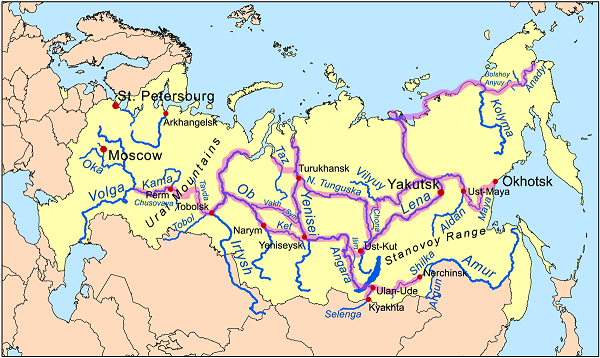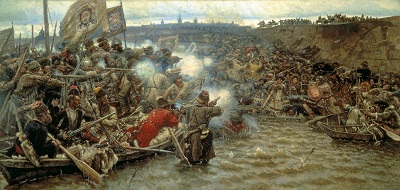The Tatar fortress was taken by assault. The conquerors continued their navigation.
Continuing The Cossacks Conquer Siberia,
our selection from History of the Russian State by Nikolay M. Karamzin published in 1826. The selection is presented in six easy 5 minute installments.
Previously in The Cossacks Conquer Siberia.
Time: 1581
Place: Siberia

CC BY-SA 3.0 image from Wikipedia.
Some time passed without news of Kutchum, and the Cossack leaders, with no inquietude, gave themselves up to the pleasures of the chase in the neighborhood of the town. But Kutchum had drawn near, in spite of his wound, Mahmetkul had already remounted his horse, and on December 5th he unexpectedly fell on twenty Russians fishing in the Lake of Abalak, and massacred them all. As soon as Yermak heard of this surprise, he rushed in pursuit of the enemy, overtook them near Abalak, at the place where the borough town of Chamehin now stands, attacked and dispersed them. Then, having removed the bodies of his companions-in-arms, he buried them, with military honors, on the cope of Sauskan, near Isker, in the old cemetery of the Khans. The intensity of the cold, the dangerous snowstorms, the short winter days of these northern countries, did not permit him to think of new enterprises of any importance before the return of spring. While waiting, the peaceful submission of two princes of the Vogulitches, Ichberdei and Suklem, served soon to expand the possessions of the Cossacks. The first had his domains beyond the marsh of Eskalbin, on the banks of the Kuda or the Tavda. The second lived in the vicinity of Tobolsk. Both voluntarily offered to pay the “yassak”, or tribute in sable-skins, and took the oath of allegiance to Russia. Ichberdei was able to secure the special friendship of the Cossacks, to whom he gave his services as counsellor and guide in the unknown places.
So the affairs of internal administration, the collecting of tribute, hunting and fishing, the returns from which were indispensable in a country without architecture, occupied Yermak until the month of April. Then a mirza informed him that the bold Mahmetkul had again approached the Irtysh and encamped near Vagai with a small band. The occasion was favorable; but in order to exterminate this indefatigable enemy, secrecy and celerity were more necessary than force. Consequently the Cossack leaders, having chosen sixty of their braves, furtively approached the camp of the Tartars, cut the throats of many in their sleep, took Mahmetkul prisoner, and led him in triumph to Isker. This capture caused Yermak great joy, for he was rid of an enemy full of audacity and courage, whom he might consider as an important hostage in his relations with the fugitive Kutchum. Although Mahmetkul was covered with the blood of Yermak’s brothers-in-arms, the latter, abjuring all idea of personal vengeance, treated him with flattering consideration, while yet

Public domain image from Wikipedia.
holding him under close watch. As Yermak already had his spies in the distant sections of Isker, he learned that Kutchum, struck with the reverses of Mahmetkul, was wandering in the deserts beyond the Ischim. This usurper was about to be attacked by Seidek–son of Bekbulat, Prince of Siberia, one of his victims–who was marching against him with numerous bands of Usbeks. Upon another side he found himself weakened by the defection of the mirza Karatcha, who, abandoning him in his misfortune, had drawn away a great part of his troops, and was getting ready to encamp in the country of Lym, near a large lake, above the junction of the Tara with the Irtysh. The news was of the nature to cause a lively satisfaction to the leader of the Cossacks, whose new enterprises were to be favored by the weakness of the principal enemy of Russia, as well as by the approach of spring. Yermak, leaving a part of his troop at Isker, embarked with the other part on the Irtysh, which he descended, navigating toward the north. The tribes of the neighborhood already recognized his power, so that he advanced without obstacles as far as the mouth of the Armidzianka, where he was stopped by Tartars who were still independent, and who, ensconced in a fortress, refused to surrender. The fortress was taken by assault, and the Cossack leaders shot or hanged the principal authors of an obstinacy dangerous for the Russians. Terrified, the rest of the inhabitants swore submission and fidelity to Russia, kissing a saber dipped in blood. The present cantons of Ratzin, Karbin, and Turtass dared oppose no resistance. Farther on began the encampments of the Ostiaks and the Vogules of the Kuda. There, on the steep bank of the Irtysh their prince Demian, who had taken refuge in a fort with two thousand warriors ready to fight, rejected all Icrmak’s propositions. According to the report of the annalist: “This little town possessed within its walls a golden idol which was supposed to have been brought from ancient Russia at the epoch when she embraced Christianity. The Ostiaks kept it in a vase filled with water which they drank to revive their courage. The Cossack leaders, having driven away the besieged forces with their artillery, entered the town, but they could not discover this precious idol.”
The conquerors now continued their navigation. They perceived a crowd of soothsayers who were offering a sacrifice to their famous idol of Ratscha, conjuring it to save them from these terrible strangers. The idol remained mute, the Russians advanced with their “thunder,” and the frightened soothsayers ran to hide themselves in the thickness of the forests. It is there that the colony of Ratscha is found to-day, above the Demiansk. Farther on in the canton of Tzingal, at the place where the Irtysh, contracted by the mountains, precipitates its rapid course, a multitude of armed men awaited the Cossacks. But a discharge of musketry put them to flight, and the Cossacks took the little town of Nazym, where they found only women and children, stricken with terror and awaiting death. Yermak treated them with so much kindness that their fathers and husbands did not delay in coming to find him with a tribute.
| <—Previous | Master List | Next—> |
More information here.

Leave a Reply
You must be logged in to post a comment.